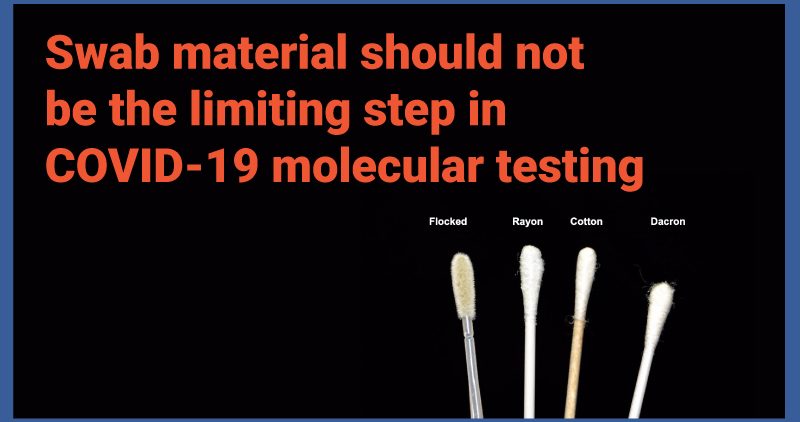
As the number of cases of COVID-19 continues to grow globally, readily available and reliable testing is essential to identifying and slowing the spread of the disease. However, we are encountering unique issues with our supply chain that limit our testing capabilities, specifically sample collection. This challenge however, is an opportunity for the scientific community to rethink our approach to sample collection technologies.
The majority of existing COVID-19 molecular tests on the market call for a sample collection method requiring swabs to be inserted into the nasal passage and the throat. The swabs themselves containing the sample are then transported in 2-3 mL of viral universal transport media (UTM) and must be kept cold with ice packs or dry ice and processed within 48-72 hours. Because the swabs remain immersed in the UTM, the CDC and the FDA recommend the use of synthetic tip swabs, preferably with plastic or aluminum shafts. Calcium alginate swabs or those with cotton tips and wooden shafts are discouraged for molecular testing for COVID-19, out of concern for the potential leaching of chemicals from the swab materials into the sample during transportation that may interfere with the PCR-based test.
However due to the pandemic and need for mass testing, the global supply of synthetic tip swabs has been severely depleted with no defined timelines for replenishment. But with COVID-19 infection rates continuing to rise, what are the options? A closer examination of the viral specimen collection guidelines from several health organizations reveal that cotton tip swabs with wooden shafts are not recommended…but that does not mean they are forbidden.
Here is an excerpt from the WHO field operations guide for collection of H5N1 (another related flu virus):
“Calcium alginate or cotton swabs, or swabs with wooden sticks may contain substances that inactivate some viruses and inhibit PCR testing and should only be used if dacron or rayon swabs are not available.”
It’s evident we are in a situation where synthetic tip swabs are “not available” or in very limited supply. In the current circumstances where lives are at stake it’s critical we keep an open mind to all available tools to combat the COVID-19 outbreak.
This is where iSWAB-Microbiome can really help and is specifically designed to address this issue. The unique design of the patented collection tube and insert system maximizes recovery of the collected biological material through release from the swab into the stabilization buffer, which can then be stored and transported at room temperature. The swab is then safely discarded after collection and does not travel with the sample— meaning that the material of the swab will not interfere with downstream applications such as PCR and sequencing based assays. Samples collected with synthetic fiber, cotton with plastic or wood shaft, and calcium alginate swabs can all be used with nearly equal efficacy in Next Generation Sequencing and PCR, as validated by Mawi DNA Technologies and our collaborators. In the past, swab-based sample collection for genetic testing was limited to specific swab types and materials, mostly synthetic fiber swabs. But iSWAB Microbiome allows us to easily and reliably use any readily available swab type including synthetic fiber, Rayon, Dacron, and inexpensive cotton swabs to collect samples for COVID-19 testing. This is ideal for field collection in both developed and developing nations because it allows the use of any accessible swabs for collection. And, it reduces the supply chain burden along with expanding the list of available tools to combat the COVID-19 pandemic.
A Journey of Innovation and Vision – The Mawi Story…...
Mawi was founded with one major goal: to simplify sample collection, transportation, and storage while making the process as painless as possible, especially for babies and the elderly. The collected ...
READ MOREMawi DNA Technologies Partners with GenoBank.io To Tokenize Our Groundbreaking…...
October 14, 2024 – We are thrilled to announce that Mawi DNA Technologies has officially partnered with READ MORE
Mawi DNA Partners with Tempus AI and Tally Health™ to…...
October 7, 2024 – Customers frequently ask what swabs are compatible with our iSWAB® non-invasive sample collection technology. Although most swab types can be used with our system, incl...
READ MORE